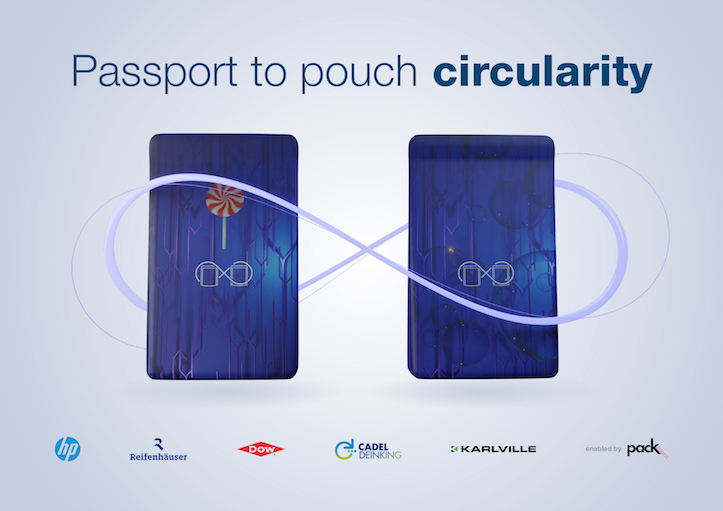 Dow, HP Indigo, Reifenhäuser, Cadel Deinking and Karlville show how digitalisation is driving packaging recyclability
Dow, HP Indigo, Reifenhäuser, Cadel Deinking and Karlville show how digitalisation is driving packaging recyclability
Following the successful launch of the Pouch-to-Pouch recycling concept for digitally printed polyethylene barrier packaging, Dow Packaging and Specialty Plastics, a business unit of Dow (NYSE: DOW), together with HP Indigo, Reifenhäuser, Cadel Deinking and Karlville, have now implemented the use of a digital product passport using the R-Cycle database as a second step.
R-Cycle is a cross-company initiative to develop an open and globally applicable traceability standard for sustainable plastic packaging.
Circular economy needs information
For a functioning circular economy for plastic packaging, two prerequisites are needed: The first is fully recyclable packaging that also has the highest possible recycled content. The pouch-to-pouch recycling concept has impressively demonstrated this requirement. And secondly, for such a material cycle to work under real-life conditions for post-consumer waste streams, the waste sorting and recycling process must improve fundamentally.
In a complex waste stream consisting of a wide variety of products, sorting by type of plastic, content and use of the packaging (e.g. food, medicines or chemicals) is still not possible today. The end result is an inferior mixture of different plastics that can only be used in recycling to a very limited extent - as a rule, they end up in thermal recovery or, at best, in downcycling. The reason for this is the lack of core information to sort plastic waste into unmixed fractions and thus turn it into a valuable raw material for new products.
The passport to bag circularity
This is exactly the information that R-Cycle provides, and the best part is: the information already exists. Production and ERP systems record, write and analyse all conceivable information about a package. All that is needed is to aggregate the relevant information and transport it along the value chain. The vehicle for this is the so-called digital product passport. In the pouch-to-pouch recycling concept, all recycling-relevant information about the packaging is recorded in a standardised data record - including the type of plastic, printing colour or recycled content - and can be retrieved via a marker.
In this way, industrial sorting plants can access the product passports of the packaging and form waste fractions that are sorted according to type. Thanks to the digital product passport, high-quality and transparent recyclable material flows are created, which can be recycled accordingly for applications of equal or higher value.
Dr Benedikt Brenken, Director R-Cycle, explains: "The digital product passport is a powerful tool to enable an efficient and data-based circular economy. R-Cycle is thus using the potential of digitalisation, as is also politically demanded within the framework of the European Union's Circular Economy Action Plan, among other things. Most importantly, we use an open and interoperable infrastructure based on proven standards that is accessible to any market participant."
Romain Cazenave, EMEA Marketing Director at Dow Packaging & Specialty Plastics, comments, "In our drive to advance the adoption of recyclable PE-based packaging, it is critical to maintain the quality of flexible plastic packaging throughout the value chain and bring it into the next high-value applications. The digital product passport enabled by the R-Cycle initiative provides seamless documentation of all necessary data in the life cycle of the polyethylene bag with recycled content. This quality information is necessary to achieve high recyclate quality in the recycling process and to close the material loop. Through Pack Studios, Dow can contribute to industrial-scale testing and production capabilities to accelerate the development of such projects worldwide."
Brand owners benefit from automation and efficient reporting
In addition to product sustainability, the digital product passport enables highly efficient data reporting - from the beginning of the value chain to the end product. Brand owners in particular can automate the calculation of (emerging) legal information obligations and, for example, show proof of recycled material, recyclability or the carbon footprint "at the push of a button". Product information for consumers can also be generated automatically from the digital product passport. Detailed tracing, for example for quality assurance in the manufacturing process, can also be easily implemented.
Learn more about the digital product passport at K 2022
R-Cycle will be presenting these and other application examples of the digital product passport for the first time this year at the world's leading trade fair for plastics processing, K 2022, from 19 to 26 October. Visit us at stand CE 07 in the Circular Economy Forum, in the heart of the leading trade fair.
www.dow.com































































































